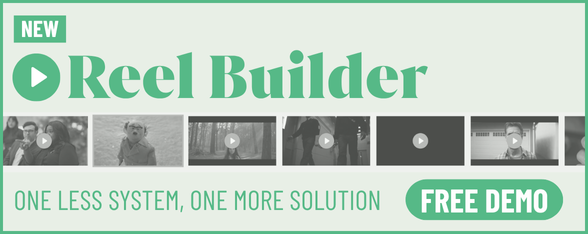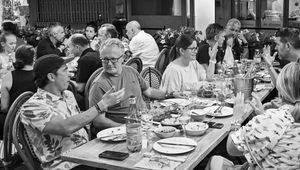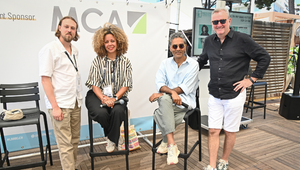
World-Class, “Sadistic” Indies Don’t Want Parachutes: “Second You Take $10, You're No Longer Independent”

Micah Walker doesn’t rule out selling Bear Meets Eagle on Fire -- the creative hot shop that won a Grand Prix this week for its work on telco Telstra -- but does think an indie’s acquisition means “you lose the very thing that you were trying to find.
He launched the agency six years ago without a client and didn’t pay himself for the first two years so he could “build something based on principles” -- he just knew he “wanted it to be a place that was capable of better things.” He “was just fine with less money than I’ve made before” but had to determine how the business made money; “I wanted to be paid based on the work, not time or service.” His first creative brief: crack Bear’s financial model.
“If you're going to be primarily project-based, you're going to charge a premium. So we're senior and we're lean,” he said, speaking on a panel called ‘Thank F*** For Indies’ on the LBB & Friends Beach in Cannes, hosted in partnership with un-held.
“It means we don't work on more than five clients at a time. And I'm happy with that, because we'll go elastic and go from eight people to 16 to 24, never less than 12 these days, but I just wanted to be able to work that way. Those were my idiosyncrasies. I wasn't trying to change the industry. I just wanted to be happy.”
In some ways, establishing principles is the easy part. Then comes resisting every temptation to compromise: taking on the wrong client, an offer of financial backing, an acquisition attempt.
“Look, I don't fault anyone who sells. There's a lot of people that make life changing decisions for whatever reasons,” the former Wieden + Kennedy, The Monkeys, and Leo creative said.
“The second you do that, you are all of a sudden, not just losing a little bit of control, but the energy is different… If the right kind of partner came along and you felt like they could allow you to be a better version of yourself, maybe. So it's not a never, but I do think you lose the very thing that you were trying to find. And some of it's also just a basic thing. I don't want my life dictated by someone else.”
Katie Newman, partner and chief marketing officer at The Grid, which houses Mischief, Courage, and No Fixed Address, said the very freedom independence offers only remains intact if “you stick to your conviction.”
“If we follow that and what makes us special, then the money will follow. If we follow the money, we will cease to be special,” she said.
“If you say yes to the wrong things, it comes at an ultimate cost down the road. The cost of taking on a client that kills your culture, or taking on a client that will buy safe work and then six months from now, their case study is what you're showing to new clients. That doesn't help.
“The second you take $10 from an outside investor, you're no longer independent. You owe someone $10. That doesn't necessarily have to be a bad thing. It could be a great thing, but you just need to make sure that you really are aligned with the mission and the values of people you get into bed with. Do they want to grow at all costs? Do they want to go fast? Will they give you permission to say no to a pitch? Do they care about the work? Those are all things that are tough conversations that you need to have before you take the backing from an investor, or a $20 million new business opportunity that could forever change the face of your culture.”
Ex-Droga CCO Tim Gordon became a chief creative officer at, and partner in, Zulu Alpha Kilo three years ago. He added, “There's something incredibly addictive about conviction. $10, $10 million, when you're in bed with someone, you're in bed with them. So you want to know who you're in bed with.
“I'm a bubble boy. I've only worked for independent agencies, I've always thrived in situations where there's very little parachute. Maybe it's sadistic.”

Independence gives the world’s largest indie, Wieden + Kennedy (with 1,400 people and eight offices -- the most recent set up in Sydney after winning McDonald's Australia) the “freedom to also be able to think long term.” Laura Rowan, chief strategy officer of the agency’s New York business, said the fact Wieden can’t be sold -- Dan Wieden wrote the legally-binding condition into a trust -- is “terrifying, because it's standing on the shoulders of greatness. It's a legacy to continue. We always say, 'work to make our kids proud', right?”
Micah has seen that trust document. “The very first interview I had with Dan Wieden, he pulled out paperwork.” It “just kind of blew me away, why he would show me that, but he was just like, 'I think you'd like to know,'” he continued, “and I did, and it was wonderful. He had a remarkable conviction, well beyond my own, and a track record of just [being] so fierce.”
The panel emphasised the necessity of being fierce with clients too. W+K wants to “be in the trenches with you”; Bear knows “it's fucking hard to make better work” and doing so requires the right kind of client; Zulu Alpha Kilo strives to “deliver something that you didn't see coming” but feels inherently right; and The Grid’s Mischief is acknowledging the most dangerous thing brands can do is be ignored.
The opportunity to push for truly great work lies with the biggest clients in the trickiest categories, they said, like Booking.com (Zulu Alpha Kilo), Telstra (BMEOF), Corrs Light (Mischief), and McDonald’s (W+K). While complex businesses can be those hardest to sell a good idea through, an agency is defined by the work it makes for its toughest clients, the panellists argued.
“The bigger the brand, the more they have at risk to lose, and the harder it can be. And for us, it does come down to really vetting partners for the right creative appetite,” Katie said of The Grid’s approach.
“Before, when we were just starting Mischief, we were betting for creative ambition. Now, we also vet for creative ambition but, also, do they have the operational ability to get good work approved?”

Tim gets “jealous a lot” and struggles “divorcing myself from the insecurity of creativity,” but believes a healthy dose of envy drives better work. Yet getting to greatness doesn’t involve overanalysing how your agency or client stacks up to others, according to Laura, or attempting to replicate something else great.
“I say this with great humility, and I'm literally not trying to sound like an asshole: we don't derive our oxygen or energy from looking outside too much,” Laura said.
“That isn't to say there's not great admiration for work we see. And we are obsessed with our brands. We're deep in our brands and trying to get in the trenches. And we believe that creativity can live on any surface. So we are more interested, particularly with our client partners that are bigger, like Ford or McDonald's or Nike, we're spending our time trying to just get into the places that we don't know as well so we can try to impact it.
“Our industry is obsessed with best practices. I've seen more briefs from clients, prospective clients, in the last five years that are like, 'I need a 'Famous Orders' idea. I need a Pop Tart idea.' Everyone's obsessed with replicating the thing they think that works. And, look, that can be helpful. It gives you a little sandbox of, 'Oh, I can unpack the type of answer you're looking for and understand your business problem from that'. But you have to have a healthy degree of going, 'What am I trying to solve, and how can I do it in a way that's going to be true and relevant and make people fucking care?'”
Tim and Micah were historically told they cared too much. According to both creatives, that’s the whole point.
“There's something really thrilling about being the one to make the mistakes,” Tim said, “that is a really exciting and addictive thing. It only comes with independence.
“If you don't have a certain amount of fear of putting work out there, then dare I say the work's not good enough. It's like, do you care enough? People would come to me and go, 'So and so creative is a little too sensitive, or they're pushing back too much, or, god, they're just fucking difficult in that meeting'. And I'd be like, 'But you want someone to fucking care, because if you don't, then what's the point. This shit is personal. You can't ask to be in a creative industry and then not expect people to care for the thing that they're putting out there.’”
Micah added, “I was always told that I cared too hard. And I was like, 'Well, I want to work somewhere where that's why people want to work with me.'”
He’s assembled a group of people who aren’t “all the same, but they have similar principles. They're self driven. They care about things when nobody's watching. Maybe a few of them are that kind of odd, misfit thing that agencies found frustrating.
“We don't always succeed ... but at least everyone's clear what we're trying to do. They're not like, 'Fuck. This guy's on his way out. This one hates me, this one just doesn't want to work hard. "We're just constantly trying to get everybody on that same thing. When you get that run, it doesn't suck.”
–
This Cannes panel was in partnership with un-held, the un-holding co. helping indies scale without a sale.
LBB’s ‘No Holding Back’ series with un-held includes:
- Tastemaking, Mould-Breaking Indies Are Telling Brands, “We Do Not Work For You. We Work Together”
- These CMOs Expect World-Class Work, Refreshed Teams, and Deep Listening
- No Holding Back With Sir John Hegarty: Ask Marketers in Pitches Whether They’ll “Bugger Off”
- Meet the Global Indies Not Held Back By Red Tape or "Profits or Politics"















